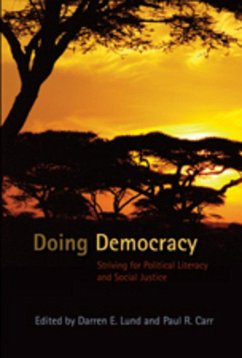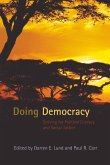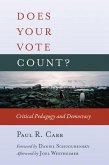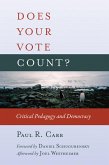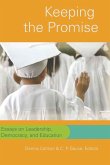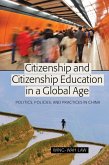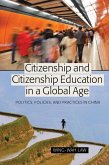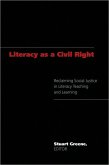In this provocative collection of essays with a distinctly critical and nuanced approach to how democracy is taught, learned, understood, and lived, authors from four continents share their visions on how democracy needs to be cultivated, critiqued, demonstrated, and manifested throughout the educational experience. The collective concern is how we actually do democracy in education. The essays argue that democracy must be infused in everything that happens at school: curriculum, extra-curricular activities, interaction with parents and communities, and through formal organization and structures.
One of the book's central questions is: Are educators merely teaching students skills and knowledge to prepare them for the world of work, or is education more about encouraging students to thrive within a pluralistic society? This book reveals that democracy is an ethos, an ideology, a set of values, a philosophy, and a complex and dynamic terrain that is a contested forum for debate.
From seasoned veterans to emerging scholars, these writers challenge the idea that there is only one type of democracy, or that democracy is defined by elections. Using a range of theoretical, conceptual, and methodological approaches, each essay makes a compelling case for how education can advance a more critical engagement in democracy that promotes social justice and political literacy for all. Diverse examples illustrate the theme of doing democracy. With its numerous models for teaching and learning to encourage critical thinking and engagement, this book is certain to be an invaluable resource to educators, researchers, students, and anyone with a passion for democratic ideals.
One of the book's central questions is: Are educators merely teaching students skills and knowledge to prepare them for the world of work, or is education more about encouraging students to thrive within a pluralistic society? This book reveals that democracy is an ethos, an ideology, a set of values, a philosophy, and a complex and dynamic terrain that is a contested forum for debate.
From seasoned veterans to emerging scholars, these writers challenge the idea that there is only one type of democracy, or that democracy is defined by elections. Using a range of theoretical, conceptual, and methodological approaches, each essay makes a compelling case for how education can advance a more critical engagement in democracy that promotes social justice and political literacy for all. Diverse examples illustrate the theme of doing democracy. With its numerous models for teaching and learning to encourage critical thinking and engagement, this book is certain to be an invaluable resource to educators, researchers, students, and anyone with a passion for democratic ideals.
"This book is designed to help educators conceptualize, design, and implement democratic education within the context of diversity and social justice in classrooms and schools. It is timely and needed because of the increasing racial, ethnic, cultural, linguistic, and religious diversity in nations around the world that is caused by international migration... A thoughtful and critical conception of citizenship education can help to advance democracy and social justice in classrooms and schools around the world." (From the Foreword by James A. Banks, Kerry and Linda Killinger Professor of Diversity Studies; Director, Center for Multicultural Education,University of Washington)
"In this era of neoliberal capitalism, democracy has been under siege. Used as a cover for imperialist policies and practices, and primed for the interests of the transnational capitalist class, the concept and exercise of democracy can no longer be taken for granted. A timely examination of the question of democracy has finally arrived in this outstanding new text by Darren E. Lund and Paul R. Carr. 'Doing Democracy: Striving for Political Literacy and Social Justice' will prove to be an indispensable work for teachers, students, and cultural workers everywhere who are struggling for a deepening of democracy, and for freeing democracy from the chains of capital. This is an important examination of the question of democracy, a powerful and erudite new work that should be welcomed by progressive educators everywhere." (Peter McLaren, Professor, Graduate School of Education and Information Studies, University of California, Los Angeles)
"'Doing Democracy' is an essential resource for teacher educators, policymakers, pre-service and in-service teachers, administrators, and anyone concerned with rebuilding our educational institutions so that they serve as beacons for personal and social transformation, rather than function to produce compliant, docile citizens who passively adhere to the dominant ideologies and structures propagated to support the interests of the political and economic elite. ... Several provocative essays from leading scholars and educators...gauge the value of various forms of democracy espoused by educators, philosophers, and politicians alike. Other contributors configure innovative research designs, generate pedagogical initiatives, and tap theoretical insights in order to highlight the institutional barriers that must be subverted to ensure that political literacy and social justice resonate loudly across educational institutions, as well as in other social contexts, to provide effective strategies for doing democracy in...schools. This book will undoubtedly become a chief guidepost for future debates, research, and reflection on what steps must be taken to foster a shared vision of democracy in both formal and informal schooling structures, one that is capable of bringing people to work collectively to eliminate institutional forms of oppression and the myriad social problems breeding hate, hostility, and environmental degradation across the global landscape at today's historical juncture." (Brad J. Porfilio, Assistant Professor, Department of Educational Studies, Saint Louis University)
"Darren E. Lund and Paul R. Carr, in concert with their contributors, have provided a rich synthesis drawn from a number of too-often disparate fields represented by democratic studies, critical pedagogy, teacher education, global studies, moral education, civic education, and social justice education. The result is a comprehensive and major contribution by which they have, with discernment and verve, managed two difficult tasks: A solid combination of depth with breadth and a reduction of the distance between theory and practice. I look
"In this era of neoliberal capitalism, democracy has been under siege. Used as a cover for imperialist policies and practices, and primed for the interests of the transnational capitalist class, the concept and exercise of democracy can no longer be taken for granted. A timely examination of the question of democracy has finally arrived in this outstanding new text by Darren E. Lund and Paul R. Carr. 'Doing Democracy: Striving for Political Literacy and Social Justice' will prove to be an indispensable work for teachers, students, and cultural workers everywhere who are struggling for a deepening of democracy, and for freeing democracy from the chains of capital. This is an important examination of the question of democracy, a powerful and erudite new work that should be welcomed by progressive educators everywhere." (Peter McLaren, Professor, Graduate School of Education and Information Studies, University of California, Los Angeles)
"'Doing Democracy' is an essential resource for teacher educators, policymakers, pre-service and in-service teachers, administrators, and anyone concerned with rebuilding our educational institutions so that they serve as beacons for personal and social transformation, rather than function to produce compliant, docile citizens who passively adhere to the dominant ideologies and structures propagated to support the interests of the political and economic elite. ... Several provocative essays from leading scholars and educators...gauge the value of various forms of democracy espoused by educators, philosophers, and politicians alike. Other contributors configure innovative research designs, generate pedagogical initiatives, and tap theoretical insights in order to highlight the institutional barriers that must be subverted to ensure that political literacy and social justice resonate loudly across educational institutions, as well as in other social contexts, to provide effective strategies for doing democracy in...schools. This book will undoubtedly become a chief guidepost for future debates, research, and reflection on what steps must be taken to foster a shared vision of democracy in both formal and informal schooling structures, one that is capable of bringing people to work collectively to eliminate institutional forms of oppression and the myriad social problems breeding hate, hostility, and environmental degradation across the global landscape at today's historical juncture." (Brad J. Porfilio, Assistant Professor, Department of Educational Studies, Saint Louis University)
"Darren E. Lund and Paul R. Carr, in concert with their contributors, have provided a rich synthesis drawn from a number of too-often disparate fields represented by democratic studies, critical pedagogy, teacher education, global studies, moral education, civic education, and social justice education. The result is a comprehensive and major contribution by which they have, with discernment and verve, managed two difficult tasks: A solid combination of depth with breadth and a reduction of the distance between theory and practice. I look

